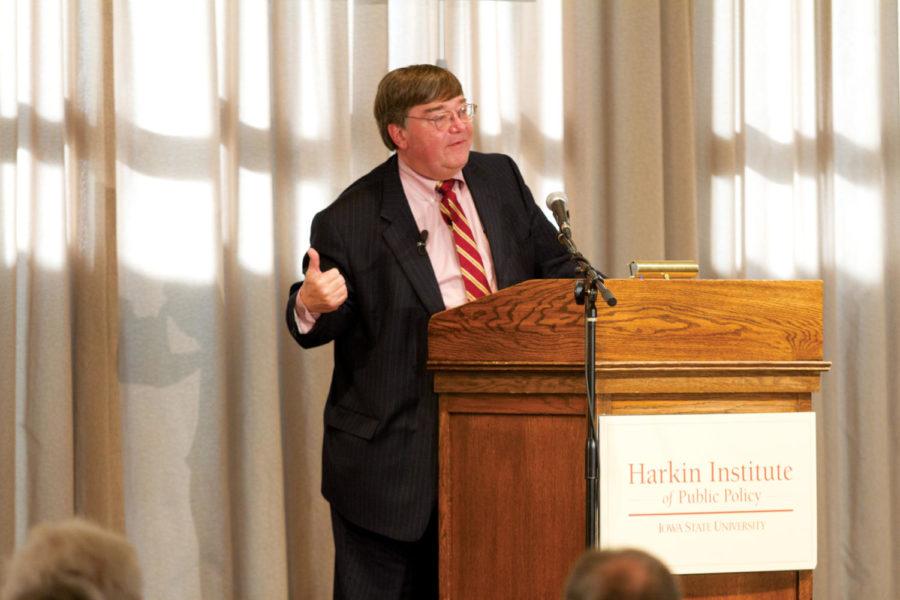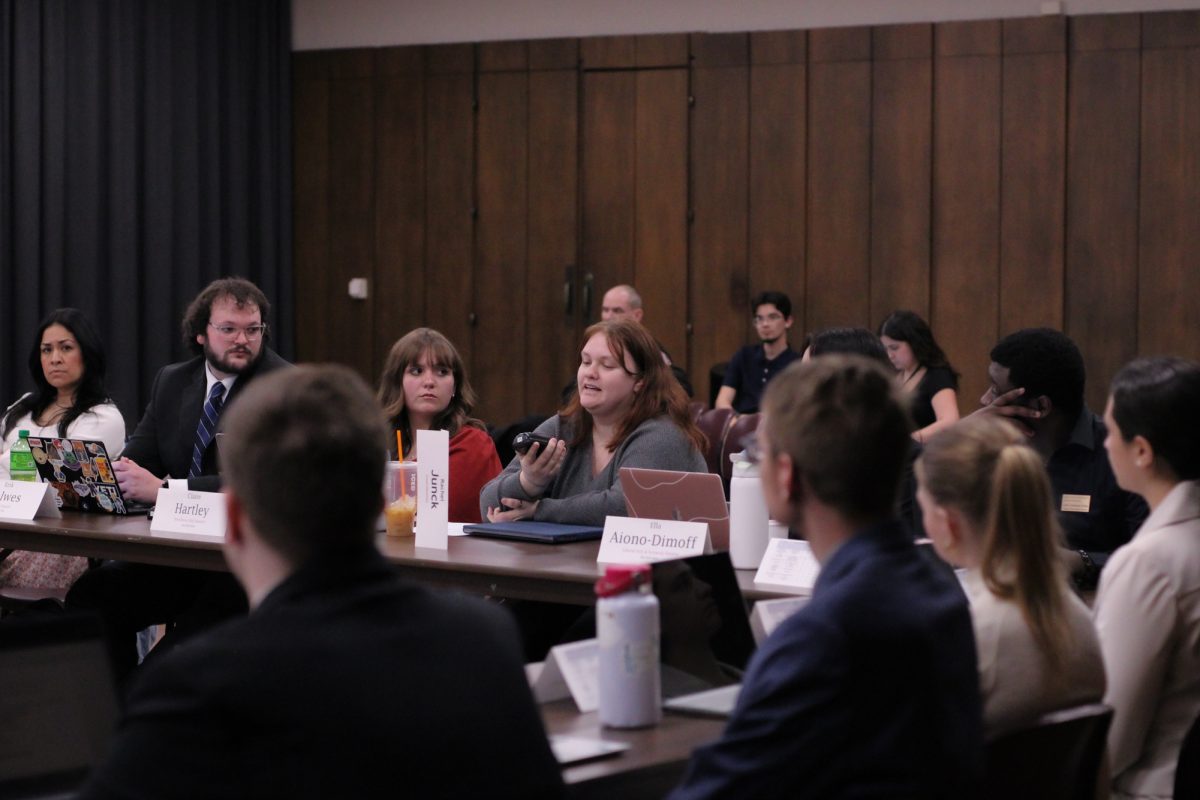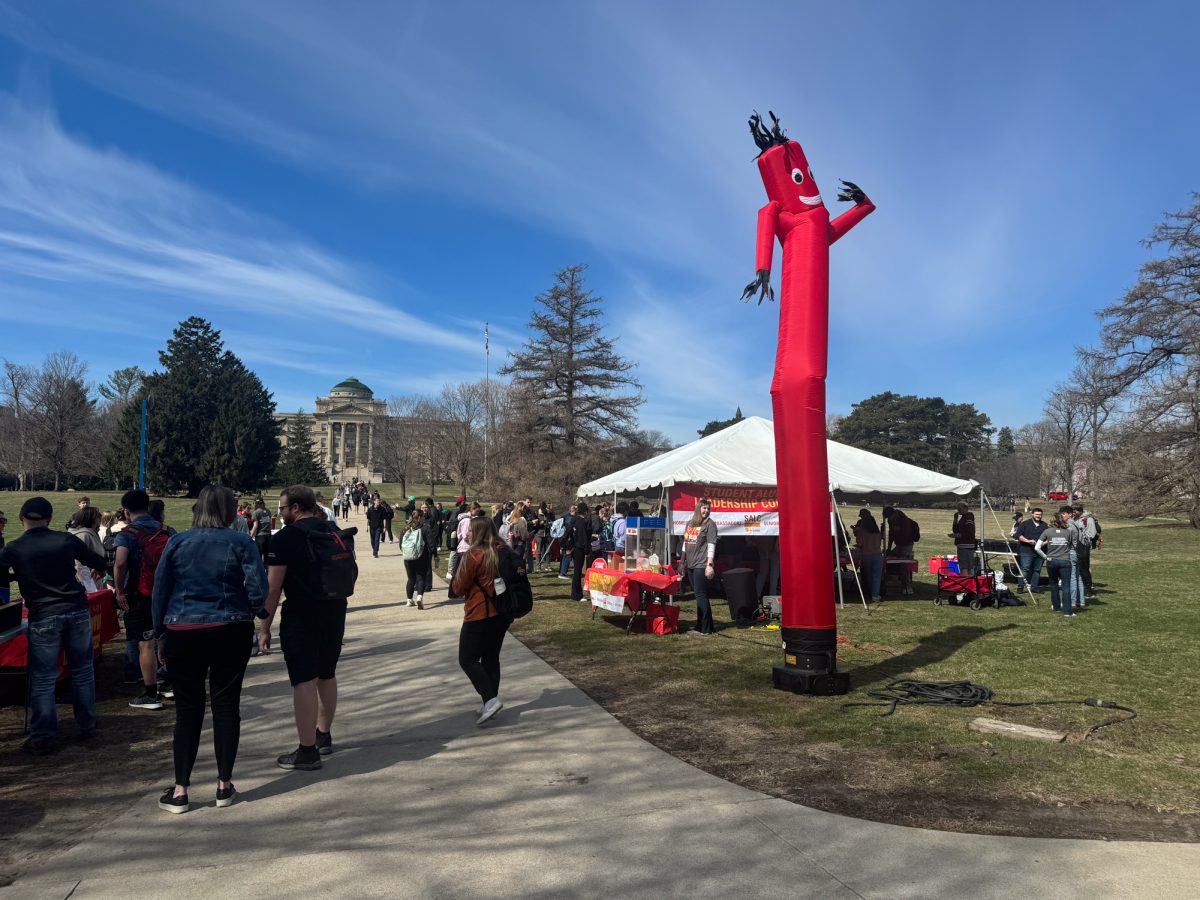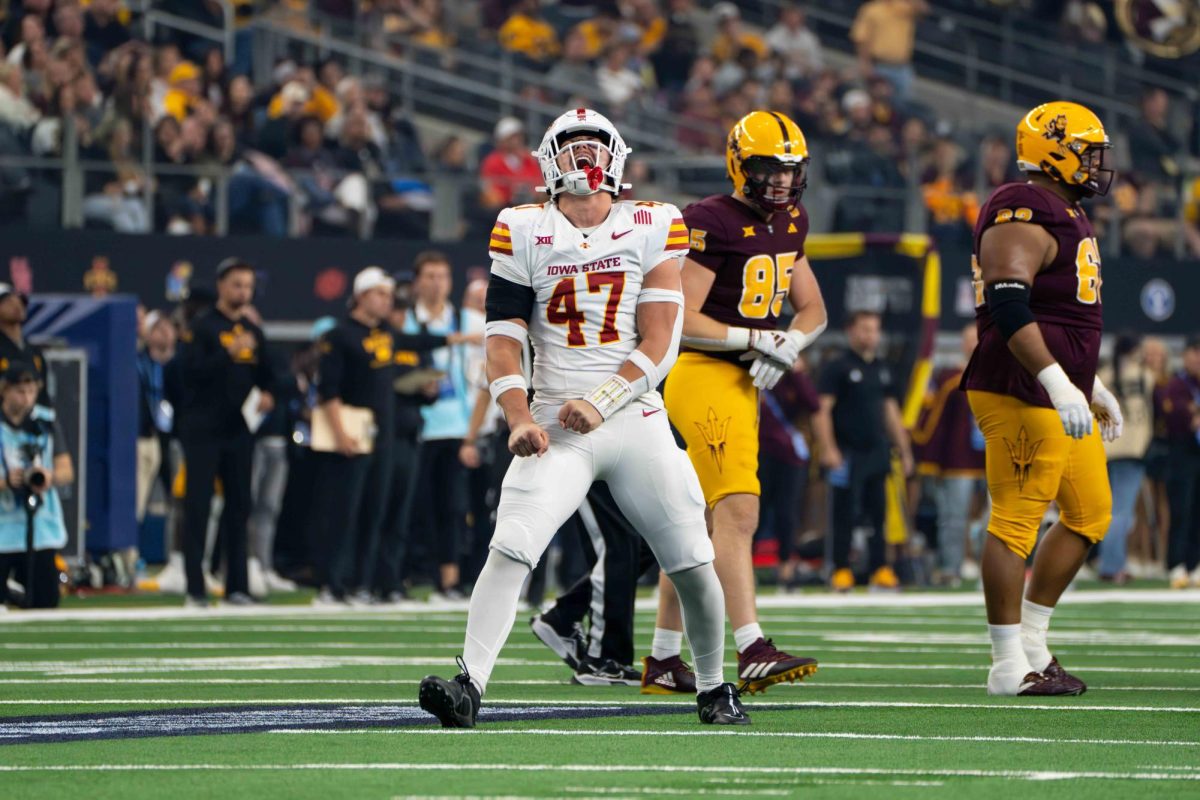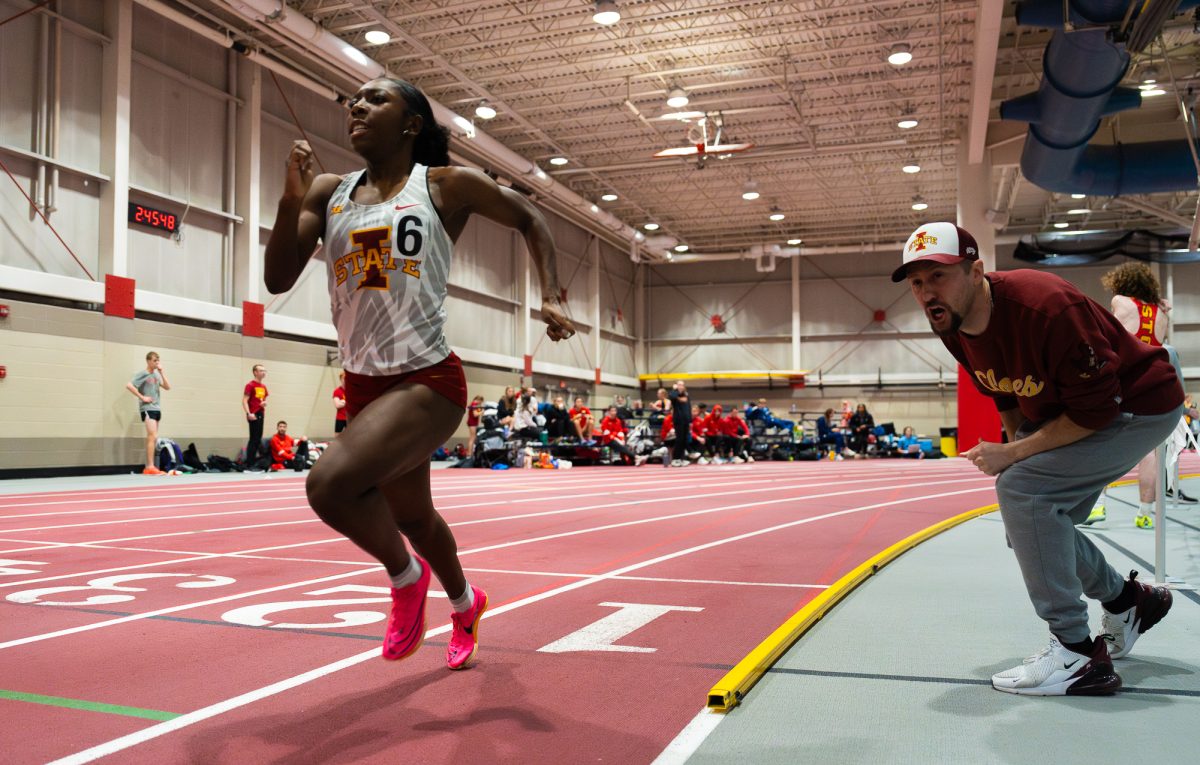NBC political analyst Charlie Cook discusses 2012 elections
Photo:John Andrus/Iowa State Dai
Charlie Cook speaks to a group of people on Tuesday, Nov. 29, including ISU President Gregory Geoffroy and Sen. Tom Harkin’s wife, Ruth. Cook is an NBC political analyst who specializes in political trending and elections.
November 29, 2011
A political analyst for NBC and the founder of Cook Political Report was brought to campus to discuss the Iowa Caucuses and the 2012 election.
Charlie Cook began his lecture Tuesday by explaining his thoughts on how America has become separated.
“To me, John Edwards, when he was running for president, he was talking about how we had two Americas,” Cook said.
Cook said Edwards wasn’t referring to the 99 percent and the 1 percent.
“To me, we have three Americas,” Cook said.
He explained there is the blue left, the red right and the independent voters, who he called purple.
“Each of these groups is so incredibly different from one another, if they aren’t speaking a different language, they are speaking a different dialect,” Cook said.
He said 91 percent of the red voters voted for Bush over Gore and 93 percent voted for Bush over Kerry.
“There is no ambiguity there whatsoever. We know what they look like. We know how they feel,” Cook said.
He then looked at the blue Democrats.
He said 89 percent of them voted for Kerry, 89 percent voted for Obama over McCain, 93 percent voted Democratic in 2006 and 92 percent voted Democratic in 2010.
“But then you get to the purple middle America and those are the people between those 40-yard lines in American politics,” Cook said.
He said 45 percent of those voters voted for Gore, 49 percent voted for Kerry, 44 percent voted for McCain and said in 2006, those independent voters voted by an 18-point margin.
“You get your mojo from the independent voters in the middle,” Cook said.
He said the middle voters are different from Democrats or Republicans in a big way.
“They don’t particularly like politics or politicians,” Cook said.
He said they don’t really watch MSNBC or Fox News.
“You know what the No. 1 rated network in the country is? It’s the USA Network,” Cook said. “It’s where you see the reruns of ‘Law and Order,’ ‘SVU’ and ‘Monk’ and ‘House’ … They’re watching things that have absolutely nothing whatsoever to do with politics.”
He said independent voters are not always clear about what they want, but they are very articulate when they are upset with one side or the other.
Cook said in 2006 the independent voters “kicked the daylights” out of Republicans because of the war in Iraq, then in 2010 the independent voters did the same to Obama and Speaker Nancy Pelosi because of the health care bill.
Cook said that among Democrats, Obama’s approval rating was 19 percent while 10 percent of the Republicans approve of what he’s doing.
He said the independents’ approval rating was 39 percent.
“You don’t get re-elected if your approval rating with independents is 39 percent,” Cook said.
Obama’s re-election
Cook said the reason Bush was re-elected is because it was the first election after the terrorist attacks of 9/11.
He said there was such a concern about terrorism and national security that keeping the U.S. safe was a very strong consideration, but at the same time the Iraq War was controversial.
Cook said if the election would have been decided by an up or down referendum on Iraq, Bush may have lost that election.
“What they were able to do is maneuver it to keep it more of a security question than Iraq,” Cook said.
Cook then started talking about Obama’s chances at re-election.
He said the economy is at 9 percent right now.
“The Blue Chip Economic Indicators, for example, is a survey of the 54 top economists in the country,” he said. “Their consensus … was for unemployment to be at 8.9 percent. That’s only one-tenth better than last time.”
He said presidents don’t usually get re-elected with that high of unemployment records.
Cook said that when Obama said he has an uphill battle to the election, he was serious.
“Especially if the situation is about the unemployment,” Cook said.
The far right
Cook then began to speculate who the Republicans will want as a candidate in 2012.
He said there used to be a mainstream party. By that, he said he meant the parties of Eisenhower, Nixon, Ford, the elder Bush and Dole.
He wondered if Ronald Reagan would fit into that party.
“He wasn’t considered a middle-of-the-row Republican then, but for a guy who signed one of the most controversial abortion bills of all time, he might not be on that stage right now,” Cook said.
He said he wonders how Bush’s theme of compassionate conservatism would hold up during today’s debates.
“The thing is, two-thirds of the Republican Party is very, very conservative and they want to nominate a very conservative candidate,” Cook said.
He said the challenge is the people who come into that wing of the party are having a hard time measuring up to what a candidate needs to do to get that election.
Cook wondered if Newt Gingrich was going to hold the lead, when he considers the people who normally win the elections are the campaigns with money, infrastructure and the expertise of people who know how to win elections.
“These two-thirds of Republicans who desperately want a really, really conservative candidate, they’re kind of getting let down one at a time,” Cook said referring to candidate Michele Bachmann and Rick Perry.
First in the nation
“Here in Iowa, you have the 50-yard line seat,” Cook said.
He said he was visiting classrooms this morning, and a point he tried to make is that there is nothing unique to Iowa or New Hampshire that they have to go first and theoretically another state could fill that need.
“But why I think Iowa and New Hampshire are unique is because you get the attention and the money, but you also understand the obligations,” Cook said.
He said Perry should have taken a different approach to Iowa.
“Rick Perry should have got in this race last January and came to Iowa and [start] his shakedown crew before the debates started,” Cook said. “If he said something that may not have been politically opportune, it would have been in front of a rotary club, not national television.”
Cook said by getting in too late in the process, Perry was more like “Spiderman” previewing in New York. “It didn’t go well,” he said.
James Hutter, associate professor of political science, asked about the future of Iowa and politics.
“I’m certainly not going to stand here and declare war on the Iowa caucus. If a southern state tries to do it, I’d say good luck to them because they may not make it past the Justice Department,” Cook said. “If Iowa were to convert to a primary, the same as New Hampshire, the next one would probably be held in the summer of 2015. In the perfect world, you do everything you can to maximize participation.”
He said the caucus has gotten to the point where it’s not a top primary level, but it’s a pretty big caucus.
Future of the straw poll
“I’m having grave doubts about the future of the straw poll because it has gotten awfully exotic,” Cook said.
He said he wonders whether the next straw poll is going to get the same kind of attention and focus.
Cook said he enjoys going around and watching the candidates interact in small venues, directly with voters.
He said if Iowa doesn’t keep being first in the nation for caucuses, he doesn’t see how Iowa could convert to a primary and maintain its roll.
“I don’t know how you’d do a caucus and maintain a secret ballot ID. To me the Iowa caucus is no longer a caucus,” Cook said.
A broken system
Cook said he believes there are real problems with electing leaders that know how to lead.
“If the normal Constitution means addressing the big problems of the country aren’t working and the work-arounds or the supercommittee aren’t working … and if the way the Founding Fathers set up the Constitution isn’t working … what is going to work?” Cook asked.
He said the problem started in the mid-1980s, but that was confined mostly to the House of Representatives.
Cook said in the House, it’s a majority that rules, but in the Senate there are filibusters and unanimous consent.
“It’s like a nonnative species being introduced into a new place and they cannot deal with it,” Cook said.
He said that what could have been the solution to the problem was 9/11.
Cook said politicians sang “God Bless America” on the Capitol steps. That was a time, Cook said, when party briefly didn’t mean much.
He said the controversy over whether or not the U.S. should go to war with Iraq or not is what took the peace and opened the sound.
Cook said he’s determined that the United States will get through this, but something will have to happen to rejigger the system.
“It’s not going to a good place right now, and that’s something we can both agree with,” Cook said.
Vice president questions
Diane Bystrom, director of the Catt Center for Women in Politics, asked Cook if he thought the rumors of Hillary Clinton being offered the vice-presidential bid were true.
Cook said there are a few reasons he doubted that would happen.
“Let’s start from the top and work down,” Cook said. “Number one, Joe Biden isn’t the problem.”
Cook said Biden could have been the problem.
“It doesn’t take much to imagine him saying things in the off-the-cuff matter that he does, but that didn’t happen,” Cook said.
He said Clinton has been a great Secretary of State.
“If you watch TV, she looks tired. I doubt she could tell you how many days are between now and Jan. 13,” Cook said. “I think this tour of duty is going to be her last and, quite frankly, under the circumstances we are in right now, I’m not sure she’d take it.”
He said her taking the vice president position probably wouldn’t be the way she would want to end her career with the way the economy is.
He said ditching the vice president wouldn’t be Obama’s best move either.
A question of faith
Cook was questioned about whether or not he thought Mitt Romney’s faith would be a factor in him winning an election.
“If I’m wrong, and Gingrich wins the nomination, I’ll never be able to live it down,” he said. “To me, the question is, if I’m right, and Romney wins the Republican nomination, is it quickly and cleanly or is it long and messy?”
He said he sees Romney picking a mainstream running mate.
Talking about the Republican Party, Cook said, “The one thing they may dislike or mistrust more than the Mormons is a President Obama.”


